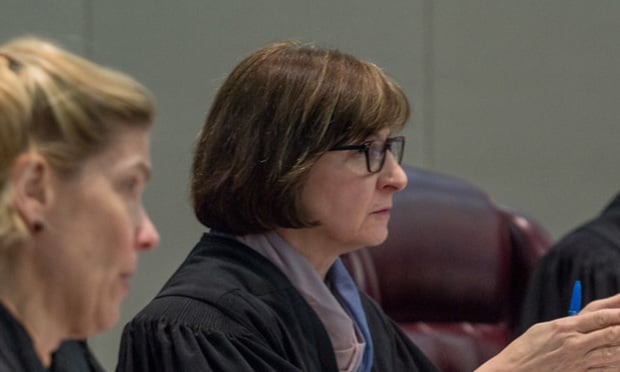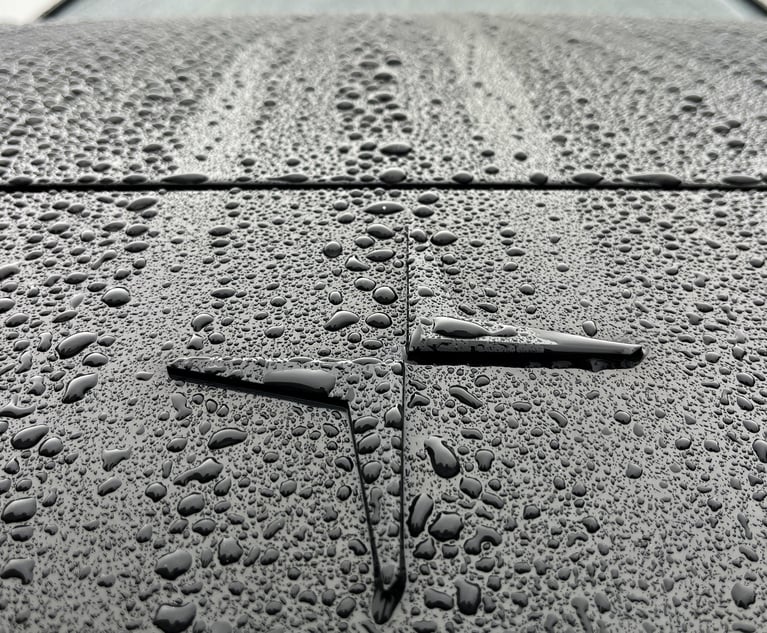AOC Now Must Notify Litigants of Affidavit of Merit Obligations
A decision by the New Jersey Supreme Court requires judiciary administrators to begin notifying parties litigating professional malpractice claims of their statutory obligations to file affidavits of merit and to schedule hearings to determine whether those affidavits are satisfactory.
December 15, 2017 at 03:53 PM
5 minute read
 Justice Jaynee LaVecchia.
Justice Jaynee LaVecchia. A decision by the New Jersey Supreme Court requires judiciary administrators to begin notifying parties litigating professional malpractice claims of their statutory obligations to file affidavits of merit and to schedule hearings to determine whether those affidavits are satisfactory.
In a unanimous ruling on Dec. 14 in A.T. v. Cohen, the court said a medical malpractice case should not have been dismissed when an out-of-state attorney, who was admitted to practice in New Jersey but apparently unaware of New Jersey's filing deadlines, failed to file a timely affidavit of merit.
Going forward, wrote Justice Jaynee LaVecchia for the court, the judiciary will be responsible for notifying parties in malpractice actions of their deadline obligations.
“[A]dvancements in our automated case management system will permit electronic notification of (1) the [affidavit of merit] filing obligation and (2) the scheduling” of conferences to determine the validity of the affidavits, LaVecchia said.
The lawsuit at hand stems from the May 11, 2011, birth of a child, identified only as A.T., at Newark Beth Israel Hospital. The action against the hospital, four doctors and other involved personnel alleged that their malpractice led to A.T. being born with Erb's palsy.
The child's mother, identified as T.T., filed the suit on behalf of her child on Sept. 25, 2013. The defendants filed their answer on Dec. 5, 2013, and demanded the filing of affidavits of merit against the defendants.
Under New Jersey statute, plaintiffs have 60 days from the filing of an answer to a professional malpractice claim to file an affidavit of merit attesting to the legitimacy of the claim. The Legislature enacted the statute in an effort to quickly weed out non-meritorious claims. Judges are allowed, on request, to give plaintiffs another 60 days to file an affidavit, according to the statute.
In 2003 in Ferreira v. Rancocas Orthopedic Associates, the court mandated that hearings be held to determine whether affidavits have been properly filed and if they met statutory requirements—such as the requirement that they be authored by a professional licensed in the same or an equivalent field.
The plaintiffs' attorney at the time—whom the court and the lawyers involved now have declined to identify—failed to comply with the statute, and no one else moved to schedule a Ferreira conference, according to the decision.
A trial judge eventually dismissed the complaint for failure to comply with the statute, and the mother appealed. An appeals court, in a 2-1 ruling, affirmed the trial court's decision. An appeal to the Supreme Court followed.
The court reversed, reinstating the suit.
LaVecchia said a presumably valid complaint should not have been dismissed because of a lawyer's noncompliance with a statute.
“The court is persuaded that equitable relief should be afforded to plaintiff,” LaVecchia said.
The court, however, issued a warning that all efforts should be made to comply with the affidavit of merit statute even with the new notification methods, which are to be developed by the state Administrative Office of the Courts.
“[C]ounsel are on notice that disregarding the scheduling of the [Ferreira] conference will not provide a basis for relief from [statutory] obligations,” LaVecchia said.
The family's attorney, Alan Roth, said the court is setting clear guidelines for attorneys' requirements to properly comply with the statute.
“This case would not have been dismissed had there been a Ferreira conference,” said Roth of Bendit Weinstock in West Orange.
Both the New Jersey Association for Justice, the state's main plaintiff bar organization, and the New Jersey Physicians United Reciprocal Exchange participated as amici.
Lawyers for both groups said the court's decision to have the AOC take a more proactive role in notifying lawyers of their obligations under the statute is a positive one.
“The court is not going to allow an injustice just because the trial court didn't do what he or she was supposed to do,” said the NJAJ's attorney, Thomas Comer, of
Eric Poe, who represented New Jersey Physicians Reciprocal Exchange, said that while he disagreed with the court's ruling in this case, he agrees with the philosophy behind the court's broader holding.
No valid cases should be dismissed because an attorney “fell asleep behind the wheel,” said Poe, who runs a firm in Princeton. Nevertheless, Poe added, an attorney who focuses his or her practice on malpractice cases “should be knowledgeable of the rules.”
The attorney for the defendants, Lauren Strollo of Union's Vasios, Kelly & Strollo, did not return a call seeking comment.
This content has been archived. It is available through our partners, LexisNexis® and Bloomberg Law.
To view this content, please continue to their sites.
Not a Lexis Subscriber?
Subscribe Now
Not a Bloomberg Law Subscriber?
Subscribe Now
NOT FOR REPRINT
© 2025 ALM Global, LLC, All Rights Reserved. Request academic re-use from www.copyright.com. All other uses, submit a request to [email protected]. For more information visit Asset & Logo Licensing.
You Might Like
View All


On the Move and After Hours: Buchanan; Malamut Law; Genova Burns; Faegre Drinker
3 minute readTrending Stories
- 1Uber Files RICO Suit Against Plaintiff-Side Firms Alleging Fraudulent Injury Claims
- 2The Law Firm Disrupted: Scrutinizing the Elephant More Than the Mouse
- 3Inherent Diminished Value Damages Unavailable to 3rd-Party Claimants, Court Says
- 4Pa. Defense Firm Sued by Client Over Ex-Eagles Player's $43.5M Med Mal Win
- 5Losses Mount at Morris Manning, but Departing Ex-Chair Stays Bullish About His Old Firm's Future
Who Got The Work
J. Brugh Lower of Gibbons has entered an appearance for industrial equipment supplier Devco Corporation in a pending trademark infringement lawsuit. The suit, accusing the defendant of selling knock-off Graco products, was filed Dec. 18 in New Jersey District Court by Rivkin Radler on behalf of Graco Inc. and Graco Minnesota. The case, assigned to U.S. District Judge Zahid N. Quraishi, is 3:24-cv-11294, Graco Inc. et al v. Devco Corporation.
Who Got The Work
Rebecca Maller-Stein and Kent A. Yalowitz of Arnold & Porter Kaye Scholer have entered their appearances for Hanaco Venture Capital and its executives, Lior Prosor and David Frankel, in a pending securities lawsuit. The action, filed on Dec. 24 in New York Southern District Court by Zell, Aron & Co. on behalf of Goldeneye Advisors, accuses the defendants of negligently and fraudulently managing the plaintiff's $1 million investment. The case, assigned to U.S. District Judge Vernon S. Broderick, is 1:24-cv-09918, Goldeneye Advisors, LLC v. Hanaco Venture Capital, Ltd. et al.
Who Got The Work
Attorneys from A&O Shearman has stepped in as defense counsel for Toronto-Dominion Bank and other defendants in a pending securities class action. The suit, filed Dec. 11 in New York Southern District Court by Bleichmar Fonti & Auld, accuses the defendants of concealing the bank's 'pervasive' deficiencies in regards to its compliance with the Bank Secrecy Act and the quality of its anti-money laundering controls. The case, assigned to U.S. District Judge Arun Subramanian, is 1:24-cv-09445, Gonzalez v. The Toronto-Dominion Bank et al.
Who Got The Work
Crown Castle International, a Pennsylvania company providing shared communications infrastructure, has turned to Luke D. Wolf of Gordon Rees Scully Mansukhani to fend off a pending breach-of-contract lawsuit. The court action, filed Nov. 25 in Michigan Eastern District Court by Hooper Hathaway PC on behalf of The Town Residences LLC, accuses Crown Castle of failing to transfer approximately $30,000 in utility payments from T-Mobile in breach of a roof-top lease and assignment agreement. The case, assigned to U.S. District Judge Susan K. Declercq, is 2:24-cv-13131, The Town Residences LLC v. T-Mobile US, Inc. et al.
Who Got The Work
Wilfred P. Coronato and Daniel M. Schwartz of McCarter & English have stepped in as defense counsel to Electrolux Home Products Inc. in a pending product liability lawsuit. The court action, filed Nov. 26 in New York Eastern District Court by Poulos Lopiccolo PC and Nagel Rice LLP on behalf of David Stern, alleges that the defendant's refrigerators’ drawers and shelving repeatedly break and fall apart within months after purchase. The case, assigned to U.S. District Judge Joan M. Azrack, is 2:24-cv-08204, Stern v. Electrolux Home Products, Inc.
Featured Firms
Law Offices of Gary Martin Hays & Associates, P.C.
(470) 294-1674
Law Offices of Mark E. Salomone
(857) 444-6468
Smith & Hassler
(713) 739-1250







